Censorship, CIA Sponsored Terror, Civil Liberties, Criminalizing Dissent, Crony Capitalism, FBI Intrusion, Gaza, Human Rights, NSA Spying, Political Prisoner, Prosecution of the Bush Administration, Surveillance, Targeting Muslims, Truth to Power
Podcast: Play in new window | Download
Updates:
—-
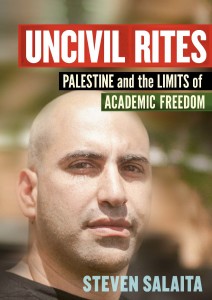
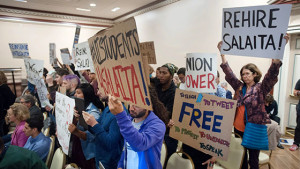
Steven Salaita Hired by American University of Beirut
In what we can view as a major victory for supporters of Palestinian human rights fired Professor Steven Salaita has been hired at the American University in Beirut in the American Studies Department. The American Association of University Professors calls Steven Salaita’s firing one of the significant violations of academic freedom in this decade. Nationwide over 5000 academics pledged to boycott the university resulting in the cancellation of dozens of scheduled talks and conferences at the University of Illinois. The University of Illinois’ action was part of a broader campus crackdown on Palestinian human rights activism that threatens both the foundational role of the university as a place of critical thinking and debate and the ability to advocate for Palestinian rights.
Guest – Professor Steven Salaita, former associate professor of English at Virginia Tech. He is the author of six books and writes frequently about Arab Americans, Palestine, Indigenous Peoples, and decolonization. His current book project is entitled Images of Arabs and Muslims in the Age of Obama.Steven grew up in Bluefield, Virginia, to a mother from Nicaragua (by way of Palestine) and a father from Madaba, Jordan. Books by Salaita, his upcoming book is titled Uncivil Rights and The Limits Of Academic Freedom by Haymarket Press.
—-
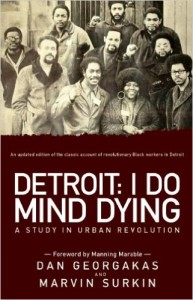
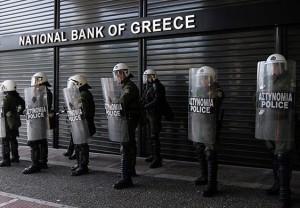
Greece Economic Crisis 2015 Update
Earlier this year we spoke with regular columnist for the National Herald Dan Georgakas about the historic election as the people of Greece voted in the anti-austerity party of Syriza, led by Alexis Tsipiras winning a 149 seats of the 300 seat Parliament. Today, the economic and political state in Greece is in a tremendous state of flux. Will Greece leave the EU and the Eurozone? Will its debt be written down and restructured?
Guest – Dan Georgakas, regular columnist for the National Herald, the leading Greek American weekly newspapero co-author of Detroit: I Do Mind Dying and coeditor of Solidarity Forever: An Oral History of the IWW. He was a frequent contributor to now defunct Journal of the Hellenic Diaspora and the Journal of Modern Hellenism. Dan has taught at NYU, CUNY, Van Arsdale Labor College, Columbia University and University of Oklahoma.
—————————————-
Censorship, CIA Sponsored Terror, Civil Liberties, Criminalizing Dissent, FBI Intrusion, Green Scare, Human Rights, NSA Spying, Political Prisoner, Supreme Court, Surveillance, Truth to Power, War Resister
Podcast: Play in new window | Download
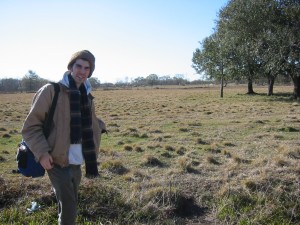
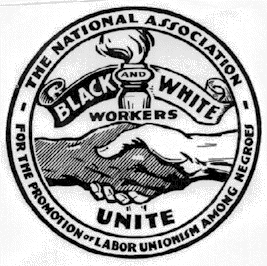
Folk Music, Labor Movements and Radical Politics
Especially in times of revolution or crisis, the role of music has been a defining element in telling the stories of labor movements, against the war in Vietnam and civil rights. Folk musician Eli Smith gave a presentation at the Left Forum this year on satirical songs of the IWW including the work of Joe Hill and many others. The early works of Pete Seeger, Woody Guthrie are a great place to start along with the lesser known work of John L. Handcox, and the Southern Tenant Farmers Union. It was the first racially integrated union in the South that used indigenous folk music to fight for the rights of sharecroppers.
Guest – Eli Smith, a banjo player, writer, researcher and promoter of folk music living in New York City. Eli is a Smithsonian Folkways recording artist and produces two folk festivals annually, the Brooklyn Folk Festival in the Spring and Washington Square Park Folk Festival in the Fall. He has appeared as a guest on terrestrial radio stations such as WBAI, WNYC, WKCR and WDST in New York and KPFA, KPFK and KUCI in California. Eli has presented panels and discussions on folk music at the Left Forum conference at Cooper Union and at the Podcamp podcasting conference in New York City. He has performed and recorded with his old time string band The Down Hill Strugglers, Peter Stampfel, John Cohen and Sam Shepard. The Down Hill Strugglers were recently featured on the soundtrack album to the Coen Brothers’ film “Inside Llewyn Davis,” which was produced by T Bone Burnett.
———
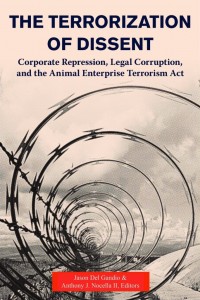
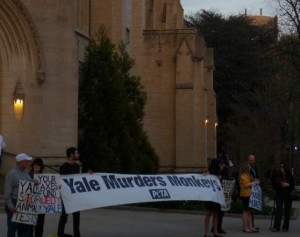
Terrorization of Dissent: Corporate Repression, Legal Corruption, and the Animal Enterprise Terrorism Act
Terrorization of Dissent: Corporate Repression, Legal Corruption, and the Animal Enterprise Terrorism Act is a collection of essays by lawyers, scholars and activists that includes interviews with those who suffered from the AETA’s conspiracy provisions. Editors Jason Del Gandio and Anthony Nocella have compiled essential information to document how the Animal Enterprise Terrorism Act is a clear violation of the First Amendment. Specifically, the book documents how corporations and the U.S. Government conspire under this law to prosecute animal rights activists and acts of civil disobedience involving environmental issues under the specter of terrorism. Right now, according to Nocella and Del Gandio, corporate profit determines what can or can’t be done to animals and the environment.
Anthony Nocella:
- The importance of this act has really shaped how the government looks at one of the larger movements in the United States.
- The animal advocacy, animal rights, animal liberation movements have been demonized and stigmatized as terrorists, through the media and the government through this particular act.
- What are the effects of this law? Who influenced this act to be pushed into law? It wasn’t really government.
- There were main organizations that pushed this law into effect. The Animal Enterprise Protection Coalition, The Animal Legislative Exchange Council (ALEC) The Center for Consumer Freedom.
- Any logical CEO of a corporation will say I don’t want anything to threaten my product.
- That product in the case of animals is any where from circuses to sea world, to clothing, from leather to fur, to also eating.
- We can do away with circuses and fur and a lot of different clothing, but one thing we can’t live without is food.
- We have to look at the real conflict and that’s between food.
- Do we want people to have a plant based diet or an animal based diet?
- There are hundreds of billions of dollars protecting that paradigm of people eating meat, fish and chicken.
- If anyone threatens that industry, under the Animal Enterprise Terrorism Act, you’re deemed a terrorist.
- To wash away all the rhetoric that is what this law is specifically speaking about. That’s why it was expanded from the Animal Enterprise Protection Act to the Animal Enterprise Terrorism Act.
- CCR Condemns Terrorism Indictment for Activists Freeing Mink from Fur Farms
- The point is – regarding the book, law schools, political science departments, think tanks, need a text that comes from a variety of viewpoints specifically looking at the Animal Enterprise Terrorism Act.
- I think we have understand the difference between how corporations are influencing laws and literally writing the bills into laws and into effect, while political repression is really law enforcement and senators influencing laws.
- We’re not criminalizing activists like we did in the 70s and 80s, now we’re labeling them as terrorists.
- National Weekend of the Animal Enterprise Terrorism Act – Sept 5-6-7, 2014
- Website – The Institute For Critical Animal Studies
Guest – Anthony Nocella II, Ph.D., an intersectional academic-activist, is Senior Fellow of the Dispute Resolution Institute at the Hamline Law School, co-founder and Director of the Institute for Critical Animal Studies, and editor of the Peace Studies Journal. He has published more than sixteen books including Terrorists or Freedom Fighters?: Reflections on the Liberation of Animals (2004), Call to Compassion: Religious Perspectives on Animal Advocacy (2011), and Defining Critical Animal Studies: An Intersectional Social Justice Approach for Liberation (2014).
————————————————————————————-
Censorship, Civil Liberties, Criminalizing Dissent, FBI Intrusion, Human Rights, Truth to Power
Podcast: Play in new window | Download
Updates:
Private Prison Corporation To Have Its Name on Florida Atlantic Football Stadium
—
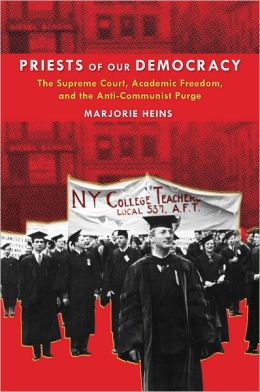
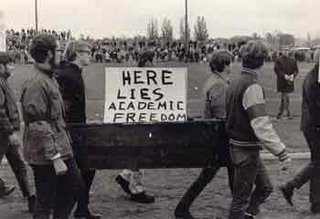
Priests of Our Democracy, The Supreme Court, Academic Freedom, and the Anti-Communist Purge
Priests of Our Democracy, The Supreme Court, Academic Freedom, and the Anti-Communist Purge is the title of the recently published book by attorney Marjorie Heins. The book examines a very dark period in academic freedom within New York City’s municipal colleges. In the early 1940s, faculty, students and staff were the target of massive investigations into their political beliefs and associations. They hauled before tribunals of the New York State legislature, dozens were stripped of their careers.
Author Marjorie Heinz shows historically, that academic freedom is nothing to take for granted and is always on shaky ground despite being protected by the First Amendment. The backlash of controversy against Students for Justice in Palestine sponsoring a Boycott Divest Sanction event at Brooklyn College is recent example. This is a book for anyone working in education to understand the court battles that tried to preserve a right protected by the Constitution.
Attorney Marjorie Heins:
- Boards of Trustees which are dominated by corporate executives don’t like these new scholars in the field of social science who are also activists.
- It’s really an attempt of political purge of this national figure.
- The burgeoning forces of academic freedom rally round him, they see the danger.
- In those early days the main attacks on the activist professors really were on activities outside the classroom in support of labor organizing.
- A bunch of professors get together from around the country and form the AAUP, American Association of University Professors. They for the first time issue a declaration of principles on academic freedom.
- The first is freedom in the classroom. The second is freedom is your research and scholarship to pursue learning where it may lead, which means overturning conventional wisdom.
- The third is what they call extramural speech, outside the walls. That was the main target of repression in that period.
- We have to get all these leftists out of the school system because they’re going to indoctrinate the tender minds of our youth with Marxist ideas.
- Harry Keyishian starts the book, he’s one of the wonderful characters I discovered as I was working on it. The Keyishian v. Board of Regents case, 1967 Supreme Court case is famous among First Amendment lawyers because it reversed prior not so good decisions, strikes down the so called Feinberg law which had been passed in 1949 and upheld by the Supreme Court.
- Feinberg law creates a very sweeping program of loyalty investigations for teachers in the public schools.
- 1952 is the height of the witch-hunt at Queens College in New York City when the Senate Internal Security Sub-committee comes to town.
- The Senate Internal Security Sub-committee starts summoning teachers at city colleges.
- “Would you tell Pablo Picasso that he wasn’t qualified to teach art?”
- It’s obscene to see college administrators running around scared like keystone cops he said.
- Some of these investigations were very broad. What books they read, what magazines they subscribed to, did you have Paul Robeson records in your home?
- It’s not until the Keyishian case in 1967 that the Supreme Court says this whole system of loyalty investigations violates the First Amendment and the due process provisions of the Constitution.
- Marjorie Heins Book Events:
- Revolution Books March 5 is sponsored by the New York Civil Liberties Union – 7PM
- Harvard Bookstore, Cambridge, MA, Friday March 15, 3 pm.
- Talking Leaves Bookstore, Buffalo, NY, Sat. March 23, 5 pm.
- Politics & Prose Bookstore, Washington, DC, Sat. June 15, 1 pm.
Guest – Marjorie Heins, a civil liberties lawyer, writer, and teacher, and the founding director of the Free Expression Policy Project. Her previous book, Not in Front of the Children, won the American Library Association’s 2002 Eli Oboler Award for best published work in the field of intellectual freedom. Other books include Sex, Sin, and Blasphemy: A Guide to America’s Censorship Wars; Cutting the Mustard: Affirmative Action and the Nature of Excellence; and Strictly Ghetto Property: The Story of Los Siete de la Raza. She is a graduate of Harvard Law School.
———

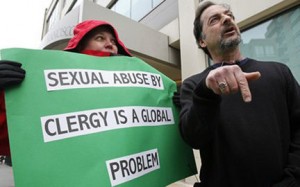
Encore Interview: New Vatican Rules On Handling Priest Sexual Abuse Cases
Earlier this year, the Vatican had revised its laws making it easier to discipline sex abuser priests. The new internal of the Vatican will use faster judicial procedures instead of full ecclesiastical trials. Critics of the revisions, say the Vatican merely tweaked the process and the new rules don’t hold bishops accountable for abuse by priests on their watch or require that they report the sexual abuse to the authorities. In the same report was the inclusion that attempting to ordain women as priests was comparable to heresy, apostasy and pedophilia. To many it was a comparison meant to resist any suggestion that pedophilia can be addressed by ending the requirement of celibacy.
Barbara Blaine:
- SNAP is now a worldwide movement of survivors. We invite supporters join us, we have approximately 10 thousand survivors. Some are spouses and family members but most are survivors; survivors of sexual abuse by priests or other clergy members. Sometimes by religious brothers, by nuns, deacons even bishops.
- We grew in 2002 and 2003 as the headlines were exploding of abuse by priests.
- We have support group meetings in the United States in about 65 different cities. We were extremely naive, not to mention wounded trying to figure out how to make it from day to day. Its empowering for us if we can protect someone who is 12 or 13 from being abused.
- Some documents was released in 2009 in Ireland. Those were the result of government investigations into the allegations of priests and other religious figures sexually abusing children. Victims across Europe, in Germany and Belgium, Austria, Netherlands, England began speaking out and reporting their abuse. In Ireland at the end of 2009, four bishops were resigning their positions.
- From our perspective, what comes out of the Vatican is a lot of lofty words and empty promises. If you look for concrete action, you’ll see very little if any. We as victims are devout Catholics and its really incredible for us to comprehend that someone in the position of authority in the church would not want us to be protected.
- It was heartbreaking and devastating to learn the policy of the church officials is to protect the predators and their assets and their reputations, not the children.
- They’re accountable to no one and its okay for them to continue and commit these crimes.
- The vast majority of victims still do not report. More than 5 thousand priests have been identified are sexual offenders who have abused children between 1950 and 2008.
- 5 percent of priests abusing children. When someone rapes a child they get fired, in the church they get promoted. SNAPnetwork.org / bishopaccountability.org
–
Attorney Pam Spees:
- We joined a conversation with SNAP looking for ways to insure accountability for what’s going on.
- Is there a legal framework that gets at the widespread nature of this. There’s one book out that discusses the 2000 year old paper trail of sexual abuse in the church.
- You’ll hear things like a cardinal or a pope attempt to make an apology. They’re sorry for what happened to these folks. It didn’t just happen.
- It shows the lack of attention and lack of awareness of the gravity of what’s going on and a prioritization of the church protecting itself and its power, rather than insuring the protection of the kids in the church and others who are vulnerable to abuse by priests.
- It also looks like an attempt to decentralize the responsibility. There are key legal experts who have discussed this as crimes against humanity.
- These are acts that are committed as a widespread or systematic assault or attack on the civilian population.
- When you’re talking about the massive sustained harm that is being caused here and the lack of awareness and acknowledgment. . it’s really astonishing.
- The International Criminal Court is a possible venue that has jurisdiction on crimes against humanity.
- The Church can’t be trusted to police itself.
Guest – Pam Spees, senior staff attorney in the international human rights program at the Center for Constitutional Rights. She has a background in international criminal and human rights law with a gender focus, as well as criminal trial practice
Guest – Barbara Blaine, founder of SNAP, Survivors Network of those Abused by Priests, the nation’s oldest and largest self-help organization for victims of clergy sexual abuse.
————————————————————
Censorship, Civil Liberties, Criminalizing Dissent, Gaza, Human Rights, Targeting Muslims, Truth to Power
Podcast: Play in new window | Download
Updates:
——–

Gaza Freedom March Report Back Speeches
We hear strong speeches detailing the experience at the Gaza Freedom March by Ali Abunimah, co-founder of the Electronic Intifada and author of One Country: A Bold Proposal to End the Israeli-Palestinian Conflict and our own co-host Michael Ratner, president of the Center for Constitutional Rights. As many listeners know, hundreds of activists with the Gaza Freedom Marchers returned from Israel, Palestine and Egypt from the largest international mobilization of people in solidarity. The Egyptian authorities refused to allow the 1,365 participants from 43 countries to enter the Gaza Strip, but later 100 people were let in to Gaza.

Michael Ratner’s Article: From Hebron to Yad Vashem: Jewish Sorrow Justifying the Sorrow of Others
Gaza Freedom March Commitments Include:
- Palestinian Self-Determination
- Ending the Occupation
- Equal Rights for All within historic Palestine
- The full Right of Return for Palestinian refugees
From: Waging Nonviolence blog. The Egyptian government didn’t let most of the over 1,300 protesters from around the world into Gaza for the planned march, but those at Judson said that they witnessed a new stage in the emergence of a global movement, facilitated by the Internet, that may well be poised to end the international support that makes Israel’s policies possible. The lynchpin of the movement, the Cairo Declaration of the Gaza Freedom March, was drafted by would-be marchers while they waited in Egypt.
—-

Faculty for Israeli-Palestinian Peace
In the wake of Gaza Siege earlier this year, many groups such as Code Pink have brought delegations of people to Israel to visit and bring support to Palestinian refugees and families. Today we talk with Joel Bitar, he’s a student who traveled to Israel with the group Faculty for Israeli-Palestinian Peace. The group is an international network of academics and students supporting a complete end to the illegal Israeli occupation of lands seized in 1967. Last summer, Joel was among many who visited Israeli universities, the Israeli settlements in the West Bank, and stayed with Palestinian families. These delegations call on the international academic community to take a stand in supporting the end to occupation in Gaza and the West Bank.
Joel Bitar:
- Most of my life I tried to hide my Palestinian identity and this trip was all about confronting and realizing who I am. For so long, especially after 9/11 it wasn’t respectable to be an Arab in America.
- I was kind of ashamed of my Dad’s history and culture for a long time. This trip was about inner healing and understanding where I came from.
- I went to the West Bank for a month and a half.
- It’s all about fitting in and surviving, being a confrontational force in a culture is something I didn’t have the courage to do unfortunately. My family has been apolitical. Doing activism around this (Gaza) has been unifying for my family.
- It’s enabled us to confront all the awful aspects of American culture and society.
- What happened in Gaza, shook me, woke me up. I’ve been doing a lot of investigating about the conflict, it seemed so mystical and mysterious. I read a couple books, it’s really not that complicated, it’s very simple. Palestine Peace Not Apartheid – Jimmy Carter / The Israel Lobby and US Foreign Policy.
- I learned about Norman Finkelstein and conflict between him and Alan Dershwitz.
- Simple in terms of the law. The law is very clear. You can’t acquire territory by force. Something you learn when you’re growing up, don’t bully people, don’t take their stuff.
- We visited numerous hot spots of the occupation, we went to Hebron, which is under vicious occupation by Israeli soldiers.
- 8 Meter high concrete slabs in many places. 85 percent of the wall runs on Palestinian land.
- Duel road systems and duel license plates.
- My Palestinian family pay taxes but don’t get the benefits of the taxes, they’re living in an imposed ghetto.
- They don’t have access to water 24/7 like every other Jew in the settlement. There’s garbage everywhere.
- We’ve been doing a lot of work with the Gaza Freedom March, with the anti-war movement at Hunter.
- A lot of the Jews who do an iota of research at Hunter know that what Israel did was awful. Breaking The Silence Report
Guest: Joel Bitar, a Hunter College student who traveled to Israel with the group Faculty for Israeli-Palestinian Peace. The group is an international network of academics and students supporting a complete end to the illegal Israeli occupation of lands seized in 1967. Joel is active with the Hunter College Campus Anti-War Network.
———————————————————————
Censorship, Civil Liberties, Criminalizing Dissent, Gaza, Guantanamo, Habeas Corpus, Human Rights, Military Tribunal, Prison Industry, Targeting Muslims, Torture, Truth to Power
Podcast: Play in new window | Download
Updates:
—

Historic International Support: Gaza Freedom March Debrief
Hundreds of activists with the Gaza Freedom Marchers have returned from Israel, Palestine and Egypt bringing home incredible stories from the largest international mobilization of people in solidarity. We hear first hand accounts from our own Michael Ratner who with his family were among the 13 hundred solidarity marchers. We are also joined by Felice Gelman who has also returned from the Gaza Freedom March. As many listeners may know, the Egyptian authorities refused to allow the 1,365 participants from 43 countries to enter the Gaza Strip, but later 100 people were let in to Gaza.
Felice Gelman / Michael Ratner:
- It was a remarkable event despite not getting into Gaza. 1400 people from 43 countries, Europe India, Australia, South Africa. Within 3 days the Egyptian government went from we need more info, we’re working with you to . . . you’re not coming.
- We were unable to get a meeting place at any time for any group of people. The Egyptians said that any gathering of more than six people would be illegal. One of the prerequisites in order to get into Gaza is you don’t engage with local opposition in Egypt. In a way it was a perfect demonstration of what the siege in Gaza is all about.
- Egypt is a police state. There are 2 million police for a population of 60 million.
- Egyptian police are very brutal with their people. They’re disappeared, they’re tortured. No room for democracy. No support for a civil society to express itself to protest.
- The thing that was incredible was the number of Egyptians that wanted to join us. There were a couple of instances where people were hurt. The secret police would try to single people out at a demonstration and punch or hit them.
- They would identify women who were Muslims. I don’t know if was that they were Egyptian and they (secret police) thought they could get away with it. They beat up a 12 year old girl and a 75 year old woman, they were not discriminating.
- Egyptians (opposition) joined in with GFM demonstrations in Cairo.
- We had a demonstration at the US Embassy in Cairo, the police surrounded them for five hours before they could get into Embassy. The US Embassy didn’t seem to think that this was bizarre until they were reminded of their legal obligation to help their citizens.
- the US Embassy informed the Egyptian police that they had no objection of us going to Gaza.
- There were some people who went to Al-Arish, and the Egyptian police were onto that. They surrounded a hotel in Al-Arish
- (Michael Ratner) I can’t imagine the logistics and the organizing nightmare it was for you guys
- I can’t think of a time since the Spanish Civil War, that there was a contingent of such size and national breadth that traveled to assist people in their distress from a brutal attack.
- I think this was an incredible demonstration of where the world stands on Gaza.
- My kids 19 and 21, seeing people with the courage to go to these demonstrations from all over the world. Out of that I think there will be a global organizing structure.
- The other thing is the drafting of the Cairo Declaration, drafted by the South African delegation. Calling on the ending of the occupations of Gaza and the West Bank, primarily with global BDS movements. (Palestinian unified call)
- When Gaza was getting attacked, it was the South African trade unionists that refused to load the weapons that were being sent to Israel.
- The potential for labor to move on this is enormous and powerful.
- The Gaza Freedom March website will be handed over to the committee working on the Cairo Declaration.
- New York Report Back – Judson Memorial Church January 21 / 55 Washington Square S.
Guest: Felice Gelman, member of the Wespac Middle East Committee and a member of the Steering Committee that organized The Gaza Freedom March. She has traveled to Gaza twice since the Israeli invasion last year.
—————–
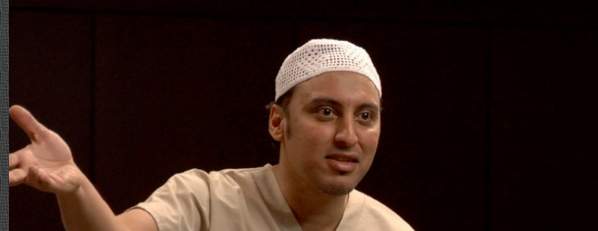
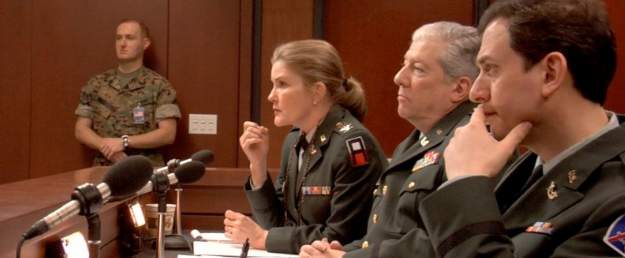
The Response: Sig Libowitz – Combatant Status Review Tribunals
January 11, 2010 marked the 8th anniversary since the Bush administration turned the US Naval Base at Guantanamo Bay, Cuba into a “enemy combatant” detention facility. Essentially re-commissioning the base as a torture chamber and legal black hole, where prisoner suicides are considered acts of war. As we’ve reported on in the last few months, the Obama administration has held on to the power to allow for a preventive detention system that would indefinitely jail terror suspects in the United States without trial. Meanwhile, military tribunals are now mainstream news, the tribunals are called Combatant Status Review Tribunals, where military justices discern who is an enemy combatant. These trials are also the subject of a 30 minute film titled The Response. The film is written and produced by actor Sig Libowitz who is transitioning from being an actor playing an attorney on the TV series Law and Order, to becoming a real lawyer. While in law school, Libowitz was tranfixed by the tribunal process of no jury and no defense lawyer. The film is based on actual court transcripts and is shortlisted for The Academy Award. The Response is screening at Columbia University’s School of Law on January 20th at 6pm.
Sig Libowitz:
- Michael Ratner: First of all there was no real process for people in Guantanamo. Then we won the right to Habeas Corpus, to go into a federal court and challenge their detention. At that point the Bush Administration set up a special process in Guantanamo.
- As we depict in the film, this is a process where the detainees don’t have a lawyer, they are not provided with the evidence that’s against them. The real transcripts told the story of the detainees and the judges in these CSRTs. From that I saw an incredible movie, and incredible opportunity.
- Because, I thought I had an understanding of what Guantanamo was all about, then I read the transcripts (of a CSRT) It gives a human dimension to the detainee and the military judges.
- Screening at Columbia Law School, Wednesday January 20th 6PM All the cast will be there and Shane Kadidal and Matthew Waxman. We’ve screened the movie at the Pentagon.
Guest: Sig Libowitz, an American lawyer, actor, film executive and director. Libowitz is notable for producing, directing and starring in a film, The Response, he wrote after reading some transcripts from Guantanamo captives‘ Combatant Status Review Tribunals. Libowitz is an executive for the acquisitions department of Turner Classic movies. He had a recurring roles in The Sopranos and Law and Order.
——————

Free Fahad Hashmi
Fahad Hashmi a Pakistani born American student, has spent nearly 2 1/2 years in solitary confinement in a Manhattan detention facility. He has been isolated for one of the longest periods in America as a suspect before trial. Hosts reported on this case in March 2008, we spoke with Fahad Hashmi’s father Syed Anwar, and Fahad’s attorney Sean Mayer. Fahad is accused of storing waterproof socks, ponchos and raincoats. The US charges were based on allowing an acquaintance “Janaid Babar” to store this rain gear in the closet of his London flat. Janaid Babar was a paid government cooperator who has been used to testify against Muslims around the world. Nicknamed ‘Supergrass’ by the British media, Babar was used by the UK government to testify against Omar Khyam and several other Muslim men in the so-called Fertilizer Case. Meanwhile Fahad’s trial is expected in January 2010, the prosecution will use Junaid as a main witness. Hashmi has been held under the SAM’s Special Administrative Measures that include a 23 hour a day lockdown, constant video surveillance of his cell and limited visitation.
(Fahad’s Brother)Faisal Hashmi:
- I’m under SAMs as our family is. Our visits with him, we can’t talk about it, but I can say from open court, he looks frail, he looks jittery He’s been in solitary confinement for 2 and half years.
- He’s in the Metropolitan Correctional Center a few blocks from here. Within his own cell, he’s videotaped at all times. He’s not allowed to talk out loud. He has a microphone in his cell.
- This is about deconstructing a human being, depriving him of his humanity. He’s 29 years old.
- Charged with four counts of material support for terrorism. He stored ponchos and rain gear.
- In 2004, this acquaintance while working on his Master’s degree stayed with Fahad.
- This was January 2004, he went to the US in April 2004, was arrested, and became a cooperating witness for the US government. At this time about 8 people got arrested, some in Pakistan, London and Canada, all on Junaid Barbar’s witness cooperation.
- In June 2006, my brother gets arrested. They tell Fahad, that Junaid gave the ponchos and gloves to Al-Qaeda and you gave material support to terrorists. You let Junaid use your cell phone, and Juanaid borrowed 300.00 from Fahad, saying that his ailing daughter needed the money. Fahad’s trial starts January 6, 2010
- FreeFahad.com This case has nothing to do with ponchos and socks.
Jeanne Theoharis:
- This is a case we need to be concerned about for those who value the first amendment. I had Fahad as a student in Brooklyn College in 2002
- There’s no way to understand this case without understanding the way Fahad was being watched many years ago even as a college student. We’ve sent a letter to the attorney general addressing 3 main issues, the conditions of his confinement, the way his due process is being violated and then first amendment issues.
- The letter was signed by more than 550 scholars and writers. Organizing among the Muslim student community.
- Theaters Against War calling attention to Fahad’s case.
- Free Fahad Vigil January 18, 2010
Guests: Fahad’s brother Faisal Hashmi and Jeanne Theoharis, an associate professor of political science at Brooklyn College, City University of New York. She was one of Fahad’s professors and she has been following this case.
———————————————————————
Afghanistan War, Censorship, Civil Liberties, Climate Change, Criminalizing Dissent, FBI Intrusion, Habeas Corpus, Human Rights, Surveillance, Targeting Muslims, Torture, Truth to Power
Podcast: Play in new window | Download
Updates:
—————————–

Capitalism Hits the Fan: The Global Economic Meltdown and What to Do About It (THE BOOK)
Today we welcome back Rick Wolff, Professor of Economics at the University of Massachusetts to discuss his new book titled Capitalism Hits the Fan: The Global Economic Meltdown and What to Do About It. In his book, Rick takes the reader back to 2005 and step by step reveals how policies, economic structures and wage-to-profit systems led to a global economic collapse.
Rick Wolff will give us an update on why the media claims the recession is over, he also tells us if there be another leg down as predicted in the September 21st interview. Another leg down meaning, will the economy continue to drop? This was mentioned because of the way people were investing, investing in a way that expected the market to drop.
Rick Wolff:
- The origin of the economic crisis goes deep into history. It’s one of the key things that people don’t understand or want to face. Roots of a System’s Crisis
- We were a country founded by foreigners coming here, they got rid of the indigenous population. They established a mix system. Capitalism on one hand, with employers and employees, and then self employed farmers and small crafts people, and in the Southern US, slavery.
- When the dust cleared, capitalism came through, it destroyed slavery and suboridinated the self employed to be small and on the margins.
- For 150 years – 1820-1970 the growth of capital was outrunning the available labor supply. Laborers had options, could go West.
- For 150 years, the goods and services a person could buy from an hour of their wages kept going up. It produced a strange and unusual notion that you were blessed, if you worked hard you would make more money.
- That Americans could have a dream like that. . their children could have a better life and deliver on the promise.
- It drew millions of immigrants from all over the world etc.
- Then after the 1970s capitalism reminded us that it is not a guarantee that if you work hard you will be rewarded.
- In the last 30 years wages have not anymore gone up. It’s a sea change in our culture’s history.
- Wages stayed the same for these reasons:
- The arrival of the computer that substituted people for machines on a mammoth scale
- The movement of corporations to other parts of the world to take advantage of cheaper labor.
- Women and immigrants moving into the paid labor force. This plunged the US economy into a disaster zone.
- The end of rising wages. Americans today work 20 percent more hours a week, than their counterparts in France, Germany or Italy. They are exhausted physically. The families are in disarray.
- Then to consume more, live the American dream, they borrowed on credit, the likes of which no working class in the history of the world has ever done.
- The average debt of US family in the 1920s equaled about 1/3 of its annual income. In 2007, the level of debt equaled 125 percent of annual income. At the same time, the last 30 years have been greatest boom of profitability of American corporations.
- Where did the money come from to lend unprecedented amounts? The money came from the boom in profits made possible by there no longer being a rise in wages. You not only get the profitability of a flat wage situation but you get the added income from the interest that comes from lending.
- The reforms and regulations we’ve seen, don’t work. The only thing that got Americans working again after a 10 year depression – 1929-1939, was not economic reform and regulation, it was something called WWII.
- Corporations used their profits to weaken reform laws, buy politicians, create army of Lobbyists.
- The American people MUST demand different responses to this crisis than what there was in the past.
- Handing corporations the citizen’s tax money as bail out is folly.
- We have 15 million adults looking for work, 10 million more are discouraged and have given up.
- The first thing this government should do is provide work for the unemployed.
- Not bailing out the banks. The private sector has failed in the United States.
- The government should support enterprises that workers run them, form them as their own enterprises in a collective way that is different from capitalist corporations
- Let workers choose if they want to work for an enterprise run by workers or capitalists. Let us as consumers choose from good and services produced in a non-capitalist way alongside the capitalist.
Guest – Rick Wolff, Professor of Economics at University of Massachusetts at Amherst. In his new book Capitalism Hits the Fan: The Global Economic Meltdown and What to Do About, Rick takes the reader back to 2005 and step by step reveals how policies, economic structures and wage to profit systems led to a global economic collapse.
—–
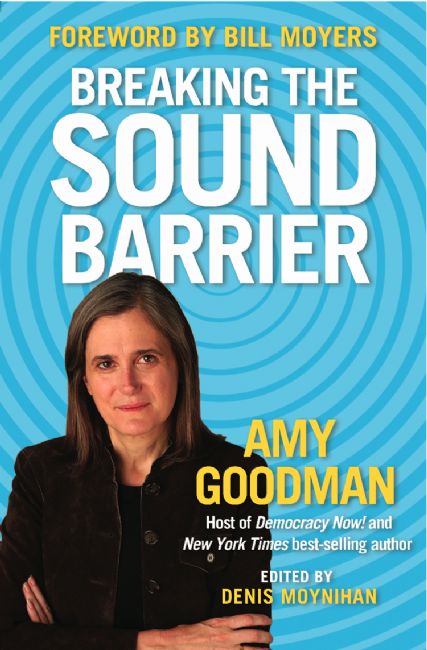
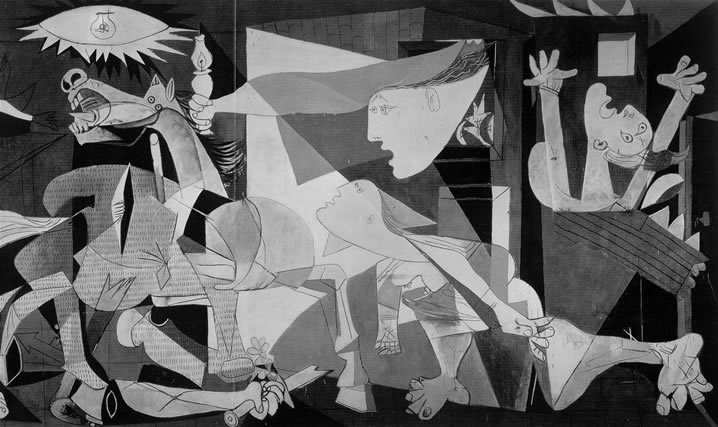
Amy Goodman: Breaking the Sound Barrier.
Today, we’re very pleased to talk with award-winning investigative journalist and syndicated columnist, author and the host/executive producer of Democracy Now! Amy Goodman. Her new book titled Breaking the Sound Barrier is a collection of wide-ranging articles reminding the reader of what true independent journalism can do. Amy’s style of journalism breaks through the corporate media noise with stories from community organizers in New Orleans to the brave soldiers resisting war in Iraq and Afghanistan. Truthout
Author and journalist Chris Hedges writes : “Amy Goodman is one of the most important voices in America. She defies the noise and clamor of celebrity gossip. She challenges the manipulation of information and dissemination of lies by the power elite. She refuses to pander to a culture where news is seen as another form of entertainment designed to bolster corporate profits. She holds steadfast to the core values of our trade. Her integrity and honesty remind us that a culture that cannot distinguish between illusion and reality dies.”
Amy Goodman:
- Picasso’s famous anti-war painting Guernica in front of the UN Security Council. When Colin Powell went to the UN and they had a press conference, this painting was the backdrop and so they shrouded it in a blue curtain. We have to rip that shroud every which way, we have to tear it, because that’s what journalism is all about.
- Most of the voices in these columns are the people we interview on Democracy Now. The media is ahistoric, it whites out history. How are young people supposed to figure out what to do when they have no sense of what came before? What are the models, what works, what doesn’t work?
- Look at the money shifting from those who least have it to those who most have it, whether we’re talking about the economic meltdown. Obama surrounding himself by the Goldman Sachs folks.
- The model of community organizing has to be adopted by people all over the country.
- It’s not going to happen because there’s one person in the white house.
- The people with money and power walking the halls of the west wing, whispering in the commander in chief’s ear, and he says, if I do that, they will storm the Bastille.
- If there’s no one out there that he’s pointing at, we’re all in very big trouble.
- Breaking the Sound Barrier is the name of the column I do every week and the column appears in more than a hundred newspapers around the country. I think it is very important for people who consider themselves activists in this country hold their leaders accountable.
- It’s the right for people to conduct their lives in this country without being spied on or infiltrated.
Guest – Amy Goodman, host and executive producer of Democracy Now!, a national, daily, independent, award-winning news program airing on over 800 TV and radio stations in North America. Time Magazine named Democracy Now! its “Pick of the Podcasts,” along with NBC’s Meet the Press.
Goodman is the first journalist to receive the Right Livelihood Award, widely known as the ‘Alternative Nobel Prize’ for “developing an innovative model of truly independent grassroots political journalism that brings to millions of people the alternative voices that are often excluded by the mainstream media.” She is also one of the the first recipients, along with Salon.com blogger Glenn Greenwald, of the Park Center for Independent Media’s Izzy Award, named for the great muckraking journalist I.F. Stone.
—————————————————————-













